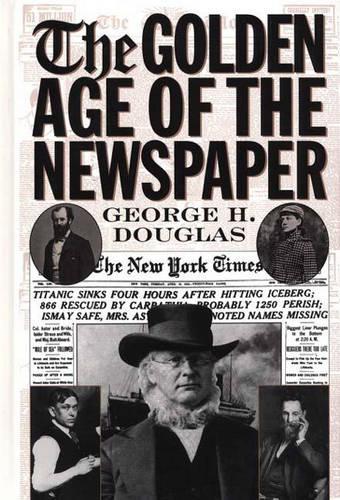
The Golden Age of the Newspaper
(Hardback)
Publishing Details
The Golden Age of the Newspaper
By (Author) George H. Douglas
Bloomsbury Publishing PLC
Greenwood Press
30th July 1999
United States
Classifications
Tertiary Education
Non Fiction
Media studies: journalism
Social and cultural history
071
Physical Properties
Hardback
328
Description
From the arrival of the penny papers in the 1830s to the coming of radio news around 1930, the American newspaper celebrated its Golden Age and years of greatest influence on society. Born in response to a thirst for news in large eastern cities such as New York, Boston, and Philadelphia, the mood of the modern metropolitan papers eventually spread throughout the nation. Douglas tells the story of the great innovators of the American pressmen like Bennett, Greeley, Bryant, Dana, Pulitzer, Hearst, and Scripps. He details the development of the bond between newspapers and the citizens of a democratic republic and how the newspapers molded themselves into a distinctly American character to become an intimate part of daily life. Technological developments in papermaking, typesetting, and printing, as well as the growth of advertising, gradually made possible huge metropolitan dailies with circulations in the hundreds of thousands. Soon journalism became a way of life for a host of publishers, editors, and reporters, including the early presence of a significant number of women. Eventually, feature sections arose, including comics, sports, puzzles, cartoons, advice columns, and sections for women and children. The hometown daily gave way to larger and impersonal newspaper chains in the early twentieth century. This comprehensive and lively account tells the story of how newspapers have influenced public opinion and how public demand has in turn affected the presentation of the news.
Reviews
.,."students....will be enriched by the author's sold scholarship and stimulated by its vigorous presentation."-Journal & Mass Communication Educator
...students....will be enriched by the author's sold scholarship and stimulated by its vigorous presentation.-Journal & Mass Communication Educator
Amply footnoted and with an extensive bibliographic essay, this scholarly yet easily accessible title is an outstanding resource for students.-VOYA
George Douglas' Golden Age of the Newspaper provides a fine history of the American newspaper, considering its growth in modern urban locales and how bonds developed between the newspaper and its readers. From circulation wars to social reporting, this provides a fine survey of the newspaper's sometimes stormy evolution.-Wisconsin Bookwatch
The Golden Age of the Newspaper is an enjoyable read. Douglas writes well and presents an engaging story. The book provides a good introduction to this topic...-The Historian
This browsable volume offers readers glimpses of the men and women who made American journalism the crass, clumsy, down and dirty, but always exciting medium it remains today.-School Library Journal
This comprehensive account tells the story of how newspapers have influenced public opinion and how public demand has in turn affected the presentation of the news.-New Books in the Communications Library
This well-written, thoroughly researched book covers not only the big dailies but also the small, special interest publications--the black press, religious papers, trade union news, and the foreign language press.... A wealth of information is provided.... Recommended.-The Book Report
Nicely fills a curricular hole.- Pennsylvania School Librarian's Association
Nicely fills a curricular hole.-Pennsylvania School Librarian's Association
Nicely fills a curricular hole.Pennsylvania School Librarian's Association
"Amply footnoted and with an extensive bibliographic essay, this scholarly yet easily accessible title is an outstanding resource for students."-VOYA
"Nicely fills a curricular hole."-Pennsylvania School Librarian's Association
"The Golden Age of the Newspaper is an enjoyable read. Douglas writes well and presents an engaging story. The book provides a good introduction to this topic..."-The Historian
"This browsable volume offers readers glimpses of the men and women who made American journalism the crass, clumsy, down and dirty, but always exciting medium it remains today."-School Library Journal
"This comprehensive account tells the story of how newspapers have influenced public opinion and how public demand has in turn affected the presentation of the news."-New Books in the Communications Library
"This well-written, thoroughly researched book covers not only the big dailies but also the small, special interest publications--the black press, religious papers, trade union news, and the foreign language press.... A wealth of information is provided.... Recommended."-The Book Report
"George Douglas' Golden Age of the Newspaper provides a fine history of the American newspaper, considering its growth in modern urban locales and how bonds developed between the newspaper and its readers. From circulation wars to social reporting, this provides a fine survey of the newspaper's sometimes stormy evolution."-Wisconsin Bookwatch
Author Bio
GEORGE H. DOUGLAS is Professor of English at the University of Illinois. A Jersey native, his father was a long-time writer and editor at the Newark Evening News. As a boy Douglas was an inveterate visitor to the paper's city room and was awed by the roar of the rotary presses. He is the author of eleven books and many dozens of articles, mostly dealing with American literature and social history. Among his books are The Early Days of Radio Broadcasting, H. L. Mencken: Critic of American Life, All Aboard: The Railroad in American Life, Skyscraper Odyssey, and The Smart Magazines.
